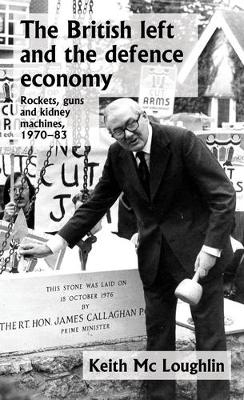
The British Left and the Defence Economy
Rockets, Guns and Kidney Machines, 1970–83
Seiten
2022
Manchester University Press (Verlag)
978-1-5261-4401-0 (ISBN)
Manchester University Press (Verlag)
978-1-5261-4401-0 (ISBN)
This book charts the dispute over defence spending between the left and business, government and the trade unions between 1970 and 1983. Whereas the left blamed Britain’s postwar economic decline on its burdensome military commitments, successive governments used defence was a form of economic stimulus to promote jobs and sell weapons abroad. -- .
Forty years before COVID-19, socialists in Britain campaigned for workers to have the right to make ‘socially useful’ products, from hospital equipment to sustain the NHS to affordable heating systems for the impoverished elderly. This movement held one thing responsible above all else for the nation’s problems: the burden of defence spending. In the middle of the Cold War, the left put a direct challenge to the defence industry, the Labour government and trade unions. The response it received revealed much about a military-industrial state that prioritised the making and exporting of arms for political favour and profit.
Looking at peace activism from the early 1970s to Labour’s landslide defeat in the 1983 general election, this book examines the conflict over the cost of Britain’s commitment to the Cold War and asserts that the wider left presented a comprehensive and implementable alternative to the stark choice between making weapons and joining the dole queue. -- .
Forty years before COVID-19, socialists in Britain campaigned for workers to have the right to make ‘socially useful’ products, from hospital equipment to sustain the NHS to affordable heating systems for the impoverished elderly. This movement held one thing responsible above all else for the nation’s problems: the burden of defence spending. In the middle of the Cold War, the left put a direct challenge to the defence industry, the Labour government and trade unions. The response it received revealed much about a military-industrial state that prioritised the making and exporting of arms for political favour and profit.
Looking at peace activism from the early 1970s to Labour’s landslide defeat in the 1983 general election, this book examines the conflict over the cost of Britain’s commitment to the Cold War and asserts that the wider left presented a comprehensive and implementable alternative to the stark choice between making weapons and joining the dole queue. -- .
Keith Mc Loughlin is a Lecturer at the University of Bristol -- .
Introduction
1 The left and the defence economy in the early Cold War
2 Guns before butter: Labour’s defence review
3 Taking on the defence economy
4 Workers and the defence economy: the case of Lucas Aerospace
5 Post-material protest? Peace activism and the defence economy
6 The defence economy, the left and the ‘second Cold War’
Epilogue
Bibliography -- .
| Erscheinungsdatum | 18.10.2021 |
|---|---|
| Verlagsort | Manchester |
| Sprache | englisch |
| Maße | 156 x 234 mm |
| Gewicht | 503 g |
| Themenwelt | Geschichte ► Allgemeine Geschichte ► Zeitgeschichte |
| Sozialwissenschaften ► Politik / Verwaltung ► Politische Systeme | |
| Sozialwissenschaften ► Politik / Verwaltung ► Politische Theorie | |
| ISBN-10 | 1-5261-4401-8 / 1526144018 |
| ISBN-13 | 978-1-5261-4401-0 / 9781526144010 |
| Zustand | Neuware |
| Informationen gemäß Produktsicherheitsverordnung (GPSR) | |
| Haben Sie eine Frage zum Produkt? |
Mehr entdecken
aus dem Bereich
aus dem Bereich
Gewalt, Umwelt, Identität, Methode
Buch | Softcover (2024)
Spector Books OHG (Verlag)
36,00 €


